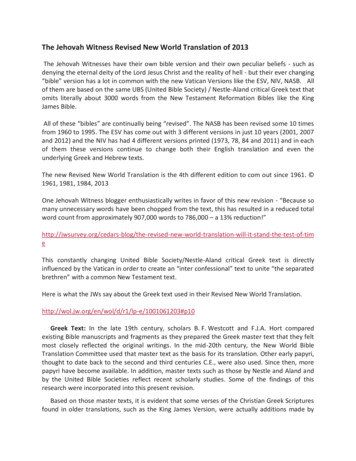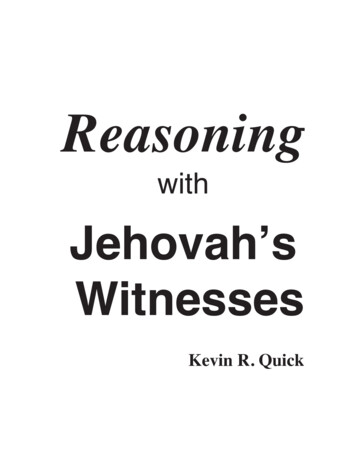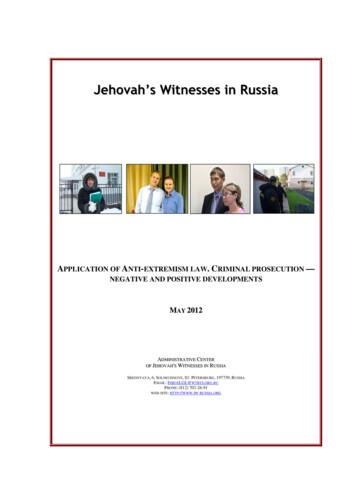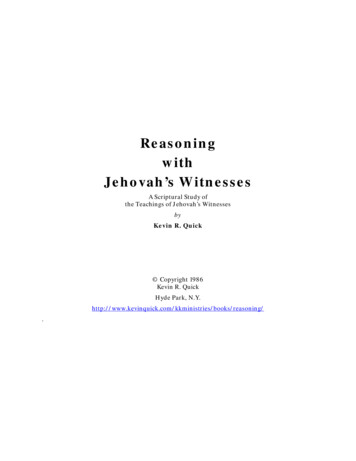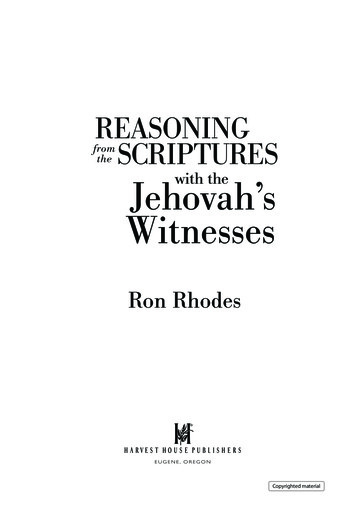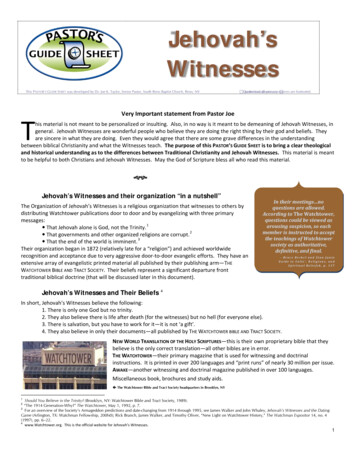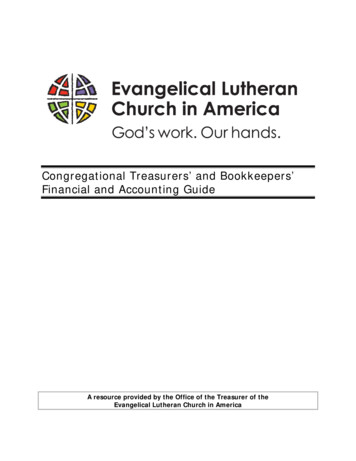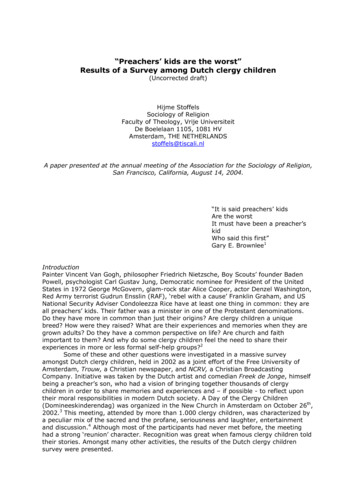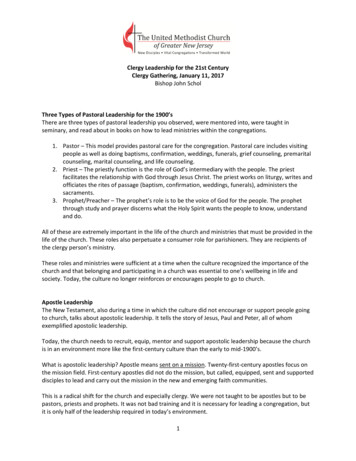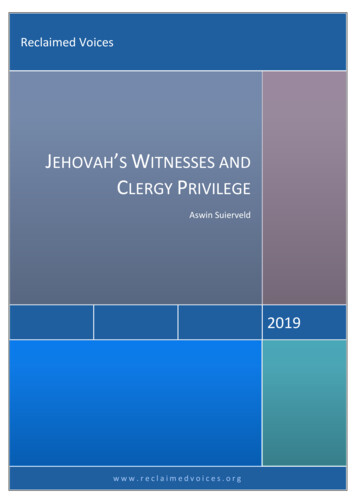
Transcription
Reclaimed VoicesJEHOVAH’S WITNESSES ANDCLERGY PRIVILEGEAswin Suierveld2019www.reclaimedvoices.org
JEHOVAH'S WITNESSES AND CLERGY PRIVILEGEAswin Suierveld
A. Suierveld, BThContact: a.suierveld@reclaimedvoices.orgReclaimed Voices ces.org 2019 Aswin Suierveld
PREFACEIn recent times it became increasingly clear to me how Jehovah's Witnesses use clergyprivilege. Meanwhile, the Ministry of Justice and Security in The Hague (the Netherlands)was discussing the introduction of mandatory reporting on the knowledge of child sexualabuse and the role that clergy privilege could play in this respect. I felt a need to gather theinformation I had. Since a clergyman can only invoke the right to refuse to give evidencewith regard to certain information according to law, I also wanted to provide insight into thepastoral care offered within congregations of Jehovah's Witnesses. A few times I use anexperience story as an example, including my own experience. They are only intended toclarify the role of elders as shepherds in the Jehovah's Witness community, and I have triedto portray them as factually as possible.I am aware that someone can argue against me that as a former Jehovah's Witness, I do nottake a neutral stand. My experience as an insider, however, offers me insights into thatworld of faith that an outsider will never have. My education helps me put things inperspective. I have tried to write this report from my professionalism, looking for a point ofview that is as objective as possible.Jehovah's Witnesses are generally kind and sincere in their faith, but as an organizationdifficult to change from the outside. This has everything to do with their religious believes. Ihave therefore added an article that is meant to gain insight in how Jehovah's Witnessesstand in (or opposite) the surrounding world.I hope this contribution will provide insight into the pastoral care by elders in the ChristianCongregation of Jehovah's Witnesses, as well as the way they make use of clergy privilege.Please keep in mind that it is originally written for the Dutch situation.Aswin SuierveldErmelo, February 10, 20193
ABSTRACTA clergyman can invoke clergy privilege before a court, but only with regard to knowledgeentrusted to him in his capacity as a spiritual caretaker. In the organization of Jehovah'sWitnesses, elders and other overseers can be considered spiritual ministers. In practice, theyseem to be granted the right to clergy privilege rather easily. Police and Justice seem to haveno or insufficient knowledge of the type of spiritual care provided by elders within thecommunity of Jehovah's Witnesses.In the pastoral care of Jehovah's Witnesses the doctrine of faith forms the starting point. Amember of the congregation has little choice as to his own wishes or wants when it comes tohis faith or the spiritual care associated with it. In their pastoral care, elders are not onlyspiritual caretakers, but sometimes also investigators and judges. Because of the involuntarycircumstances in which information is shared with the elders during internal judicialproceedings and the fact that elders then have the capacity of investigator and judge,information obtained in this way is not covered by the clergy privilege.Confidentiality seems to be understood broadly, in the sense that elders share informationwith each other and persons higher within the organization. At the same time, informationto the outside world is kept as secret as possible. Jehovah's Witnesses seem to have theirown definition of confidentiality. The question is whether this is in the interest of a memberof the congregation or whether it actually concerns the interests of the organization itself.Both due to lack of professional education and the requested obedience to the organization,elders of Jehovah's Witnesses are unable to make a professional and ethical assessmentthemselves in situations where an major interest calls for a possible breach ofconfidentiality.There are strong indications that mandatory reporting at the knowledge of sexual abuse,where there is a possibility for clergymen to invoke the right of non-disclosure, will not resultin reporting to the authorities by elders of Jehovah's Witnesses. As long as there is anexception to which they can invoke, they do not see themselves legally obliged.A redefinition of who can be regarded as a 'clergyman' with regard to clergy privilege couldprevent abuse of this right. This could also prevent certain people from wrongfully evadingany reporting duty in case of sexual abuse.4
CONTENTPreface. 3Abstract . 4Glossary . 71. Clergy Privilege (in the Netherlands). 101.1 Legal Provision . 101.2 Members of the Clergy . 101.3 What is Covered by Clergy Privilege? . 111.4 Granting Clergy Privilege . 111.5 Confidentiality Obligation (and Breaking it) . 121.6 Law and Disciplinary Measures . 131.7 In summary . 132. Spiritual Ministers at Jehovah's Witnesses . 142.1 Do Jehovah's Witnesses Have Clergy? . 142.2 Spiritual Ministers . 142.3 A Distinction is Made. 162.4 'Ministerial Servant'. 172.5 Elders . 172.6 Other Overseers . 172.7 Conclusion . 183. Pastoral Care at Jehovah's Witnesses . 203.1 Appointment and Qualifications . 203.2 Training and Equipment . 213.3 Elders’ Manual . 223.4 Pastoral Care . 233.5 Warnings When Assisting Sisters . 273.6 Finally . 274. Elders as judges . 284.1 Instructions for Reporting or Confessing Offenses . 284.2 The Judicial Committee . 304.3 Appeal Committee and Special Committee . 314.4 Confidentiality or Secrecy . 324.5 Pastoral Care and Judicial Procedures in the Case of Child Sexual Abuse . 345
4.6 The Threat of Disfellowshipping . 375. Claiming Clergy Privilege . 385.1 The Minister of Legal Protection on Clergy Privilege . 385.2 Clergy Privilege Easily Granted . 395.3 Mandatory Reporting and Clergy Privilege . 405.4 Example of Evading Mandatory Reporting by Clergy Privilege . 435.5 Investigation Royal Commission Australia and Mandatory Reporting. 446. Conclusions. 456.1 Spiritual Minister and Clergy Privilege . 456.2 The Spiritual Well-being of the Congregation Member . 466.3 To What Extent is Spiritual Care and Assistance Involved? . 466.4 To What Extent is Confidentiality Kept? . 476.5 To What Extent Can Elders Make a Professional and Ethical Assessment? . 486.6 Mandatory Reporting and Clergy Privilege . 496.7 A Fundamental Problem. 496.8 What to Do Next? . 50ANNEX A: No Part of This World . 52Bible as Fundament . 52No Part of The World . 53Jehovah's Witnesses versus Satan's world . 53True Religion. 54In Summary . 55ANNEX B: S-77 Form . 56References: . 586
GLOSSARYBethel - The name 'Bethel' means 'House of God'. This name is used by Jehovah's Witnessesfor the World Headquarters or a branch office.Bethelite - Someone who lives and works full-time on Bethel. A bethelite does not receiveany income for his work, at most a small allowance.Bible Study - A study that a Jehovah's Witness holds with a person who is not part of thereligion, usually by means of a Watchtower publication.Book Study – Full: Congregation Book Study. Meeting of Jehovah's Witnesses in smallergroups held in private homes and where a discussion was held on the basis of a Watchtowerpublication. With effect from January 2009, this meeting became part of the other weekdaymeeting in the Kingdom Hall and given the name Congregation Bible Study. It discontinuedwhen the organization started the Life and Ministry Meeting in 2016.Branch/headquarters - Jehovah's Witnesses have only one head office, also known as'World Headquarters' (WHQ). All other offices are referred to as a branch office within theorganization. The national administrative centre of Jehovah's Witnesses in Emmen (theNetherlands) is internally referred to as a branch office.Christian Congregation of Jehovah's Witnesses in the Netherlands - one of the legal entitiesthat Jehovah's Witnesses in the Netherlands use. Internationally, the best-known legalentities of the organization are Watch Tower Bible and Tract Society of Pennsylvania,Watchtower Bible and Tract Society of New York, Inc., and Christian Congregation ofJehovah's Witnesses.Circuit Assembly - Larger meeting of several congregations that together form a circuit.Jehovah's Witnesses meet twice a year like this, once two days in a row, the other time oneday.Circuit overseer - Travelling overseer who visits the congregations of his assigned circuittwice a year.Convention - Large three-day meeting of Jehovah's Witnesses held once a year.Disfellowshipping - An individual Jehovah's Witness can be excluded (disfellowshipped) for aviolation if he does not show sufficient repentance according to the elders. This means thatchurch members are no longer allowed to have contact with him, not even greet him. He hasbeen declared dead, as it were. Disfellowshipping can have major consequences for theperson in question and his immediate family, if they are still Jehovah's Witnesses.7
Elders/overseers - Office in the congregation of Jehovah's Witnesses. The terms elder andoverseer are more or less interchangeable. The term overseer is sometimes used incombination with a specific task or function (e.g. Service overseer, Field Service Groupoverseer).Field service - Another word for evangelism work.Field Service Meeting - An organized time (and location) when individual Jehovah'sWitnesses gather to perform their evangelization work.Governing Body - Group of elders responsible for the spiritual direction and policies withinthe global community of Jehovah's Witnesses.Jehovah's Witnesses - The religion of Jehovah's Witnesses. To avoid confusion, thesurrounding text makes clear whether it concerns the organization or individual believers.Judicial Committee - A committee of three or more elders formed during internal judicialproceedings at Jehovah's Witnesses and which assesses whether someone has sufficientrepentance for an offense or not.Kingdom Hall - The building where a congregation of Jehovah's Witnesses meets.Legal Department - Department at a (larger) branch that deals with all legal matters relatedto the organization of Jehovah's Witnesses.Life and Ministry Meeting - Current weekday meeting of Jehovah's Witnesses. This is alsoreferred to as 'Our Christian Life and Ministry' and replaced the Theocratic Ministry School,Service Meeting and Congregation Bible Study from 2016. The meeting focuses both ontraining for evangelism work and living according to the doctrine of faith.Meeting - A gathering for worship of the congregation of Jehovah's Witnesses.Ministerial Servant - Office in the congregation of Jehovah's Witnesses.Pioneer Service - A pioneer is someone who spends a specific and fixed number of hours onevangelism work. Jehovah's Witnesses are distinguished in the special, regular and auxiliarypioneer service. Auxiliary pioneers can be appointed to the Auxiliary Pioneers' Service for aminimum of one month, a few months in a row, or to the permanent Auxiliary Pioneers'Service. Auxiliary pioneers are expected to spend at least 50 hours per month on evangelismwork. (There is a possibility for 30 hours in some specific months). A regular pioneer isappointed for a longer period of time and spends an average of 70 hours per month onevangelism. For 1999, the hour requirement was higher. A special pioneer is usually chosenfrom the regular pioneers and sent out by a branch to serve elsewhere.Preaching (work) - Another word for evangelism.8
Public Meeting / Public Lecture - (Biblical) lecture for a general public.Service Department - Division in a branch office responsible for all matters relating toevangelism, the activities of congregations, elders, ministerial servants, circuit overseers andpioneers.Service Meeting - Meeting aimed at being effective in evangelism. This was held on aweekday after the Theocratic Ministry School and was merged into the Life and MinistryMeeting in 2016.S-77 form - Official title: Notification of disfellowshipping or disassociation. Elders mustcomplete this form with respect to a person who is excluded from the community duringinternal religious proceedings or with respect to persons who terminate their membershipas Jehovah's Witnesses by officially withdrawing. (See Annex B for an illustration of theform).Theocratic Ministry School - Weekly meeting where members of the congregation couldregister and were trained for evangelism work through talks and demonstrations.Discontinued when the organization started the Life and Ministry Meeting in 2016.Two witness rule - Policy for Jehovah's Witnesses based on their interpretation of the Bible,which states that two or more witnesses are needed to determine a violation and form ajudicial committee.Watchtower-Study - Meeting with question-and-answer discussion based on an article fromthe Watchtower. The Watchtower-Study is held after the Public Meeting, usually at theweekend.9
1. CLERGY PRIVILEGE (IN THE NETHERLANDS)1.1 LEGAL PROVISIONAccording to Dutch law, anyone who is summoned to give evidence in court is obliged togive evidence. In certain situations, such as when there are close family ties, this can bechanged. But also those who are bound to secrecy by virtue of their office, profession orwith regard to what is entrusted to them in that capacity may invoke the right to refuse todisclose (Art. 165 par. 2 sub b Code of Civil Procedure).The right of non-disclosure is recognized as a general principle of law and applies in both civiland criminal law. Art. 218 of the (Dutch) Code of Criminal Procedure (2018) says that theright to non-disclosure or refusing to answer certain questions may be invoked by thosebound to secrecy on account of their status, their profession or their office, but only aboutwhat is entrusted to them as such.Traditionally we speak of the 'classical quartet' of secret holders: the lawyer, the notary, thedoctor and the clergyman. Of the first three, it can be said that they are easily definedprofessions. But who falls under the clergy?1.2 MEMBERS OF THE CLERGYMembers of the clergy includes those who, from religious or ideological societies, performfunctions as spiritual caretakers for the spiritual well-being of affiliates, interested partiesand stakeholders, and in that context establish and maintain relationships of trust withpersons (Meijers, 2008, p.172).This may include priests, ministers, elders, deacons, pastors or church workers, but also'new' clergymen such as the imam or the pandit. Even volunteers who perform tasks withina religion or ideological community that involve secrecy, fall within the circle of spiritualministers (or members of clergy) at Meijers (2008).According to Van den Brink (2018), the term clergy of spiritual is difficult to define and thereis no legal framework that determines who belongs to the clergy. To sum up, there seems tobe agreement that there must be the exercise of a pastoral function, that there is a socialinterest involved and that it must be a relationship of trust.10
In recent decades there has been an increase in religious and philosophical groups. This alsoincreases the number of people who can rely on it to fulfil a 'spiritual ministry'. The questionis whether all these persons can rightly invoke the right of the clergyman to refuse to giveevidence, of clergy privilege.1.3 WHAT IS COVERED BY CLERGY PRIVILEGE?Not all the information that spiritual ministers find out is covered by clergy privilege.According to Dutch law the clergyman can only refuse to give evidence concerning that whichis entrusted to him as such, that is in his capacity as a clergy or spiritual caretaker (Art. 218Code of Criminal Procedure, see also: Art. 165 section 2 sub b Code of Civil Procedure). AtMeijers (2018, p.174) the secrecy of spiritual ministers extends to all that they haveobserved and been entrusted with in their capacity as spiritual caretaker and helpers withinrelationships of trust.Van den Brink (2018) mentions three factors with regard to information that falls under theright of the clergyman to refuse to give evidence: knowledge, capacity and trust. Heindicates that it is knowledge (facts and sensations) of persons who turn to the clergyman, inhis capacity as a spiritual caretaker based on confidentiality. This does not include anordinary friendly visit by the spiritual minister. The clergyman must make a distinction andmust consider whether or not he can or should refuse to give evidence with regard to acertain knowledge.1.4 GRANTING CLERGY PRIVILEGEThe judge must assess, in each situation, whether he grants the right to clergy privilege.According to Sackers (2017), in order to see whether the person in question can be regardedas a member of clergy, it is examined whether the person is working as a spiritual minister ina religion to be taken seriously.Meijers (2008) noted that the court does not examine whether a spiritual caretaker orhelper is working from a particular society, but that spiritual care, a relationship of trust anda duty of confidentiality were used as criteria for granting the right to clergy privilege. Thepublic interest, that there is free and unimpeded access to personal care, plays a major rolein this.11
1.5 CONFIDENTIALITY OBLIGATION (AND BREAKING IT)When a judge calls on a witness to make a statement before a court, this is in the interest ofestablishing the truth. Clergy privilege serves a (different) social interest, namely free andunimpeded access to spiritual care and assistance. A characteristic of the relationship oftrust is that the information about privacy given by persons (clients) with a view to good careand assistance to the spiritual ministers remains confidential and secret. Thus, the duty ofconfidentiality of ministers of religion guarantees the protection of the privacy of persons(clients) and thus also the free and unhindered access of persons (clients) to spiritual careand assistance (Meijers, 2008, p.174).The Roman Catholic confidentiality of confession is known to be accepted as an absolutesecret, but otherwise the obligation of confidentiality is relative. This means that, whereappropriate, confidentiality may be broken at the request or with the consent of the personconcerned. In the event of a substantial interest, such as (life) danger or serious damage tothird parties, the obligation of confidentiality can also be broken unilaterally - i.e. withoutpermission. Van den Brink (2018), for example, mentions child abuse as a reason in whichthe child's best interests and thus reporting will outweigh the importance of keeping silent.The following six criteria can help the spiritual minister to make his decision (Meijers, 2008,p.182):1. Every effort has been made to obtain the client's consent.2. Maintaining the obligation of confidentiality results in serious damage for the clientor for third parties.3. By maintaining professional secrecy, the spiritual minister experiences troubles ofconscience.4. Only by breaking professional secrecy can the problem be addressed or solved.5. It must be almost certain that by breaching professional secrecy, damage to theclient or third parties can be limited or prevented.6. Professional secrecy should be breached as little as possible and the client isinformed of this.The breach of confidentiality does not release the spiritual minister from his duty ofconfidentiality. He will even then only provide the information that contributes to thegreater interest.12
1.6 LAW AND DISCIPLINARY MEASURESThe clergy is not a profession within the meaning of Art. 272 of the Penal Code. A spiritualminister cannot be legally prosecuted for breaching his confidentiality. The clergy privilege isa right and not a duty. However, its own church can take disciplinary measures againstsomeone who has violated confidentiality. On a national level, there are a number ofassociations for spiritual caretakers, with their own professional codes and rules of conduct.These associations may impose disciplinary measures on their members.The breach of official secrecy may be regarded as an unlawful act. Before the civil court, theinjured party can then request the court to determine damages.1.7 IN SUMMARYIn summary, we can conclude that the spiritual minister can invoke clergy privilege withregard to information shared with him in his capacity as a spiritual caretaker. There must bea relationship of trust. The clergyman usually carries out his tasks within a religious orideological community. Concerning the possibility of invoking clergy privilege, the socialinterest of free and unimpeded access to personal care is of importance. However, clergyprivilege is a right and not an obligation. Sometimes there may be serious reasons forbreaking confidentiality. The latter requires professional and ethical consideration.13
2. SPIRITUAL MINISTERS AT JEHOVAH'S WITNESSES2.1 DO JEHOVAH'S WITNESSES HAVE CLERGY?In the book Jehovah's Witnesses - Proclaimers of God's Kingdom (1993), that offers arepresentation of the history of the religious group, is written about the early developmentof the organizational structure:They realized that the Bible made no provision for titled clergymen, with a laity towhom they would preach. Brother Russell was determined that there would be noclergy class among them. Through the columns of the Watch Tower, it’s readers werefrequently reminded that Jesus told his followers: "Your Leader is one, the Christ",but, "All you are brothers”. - Matt. 23:8,10 (p.204).In the Awake! magazine of August 2010, in the article What Do Jehovah's WitnessesBelieve?, the following is said about the distinction between clergy and lay people:“All you are brothers,” said Jesus to his followers (Matthew 23:8). The earlyChristians, including the Bible writers, had no clergy class. This Biblical pattern is theone that Jehovah's Witnesses follow (p.9).According to their teaching, Jehovah's Witnesses know no distinction between clergy and laypeople. Ordinary members of the congregation will usually say that they have no clergy.Nevertheless, the organization has a strong hierarchical structure and, on closer inspection,there is indeed a distinction. More about this later on.2.2 SPIRITUAL MINISTERS"At our baptism we are ordained as ministers" (Organized to Do Jehovah's Will, 2015, p.68).Jehovah's Witnesses know the 'adult baptism' that can only take place after the person inquestion has taken enough knowledge of the doctrine and more or less makes his ownchoice.Eventually, the Bible student, having developed a love of Jehovah God and a strongfaith in the ransom sacrifice, wishes to dedicate himself completely to his heavenlyFather (John 14:1). He makes that dedication in personal prayer and then gets14
baptized as a public symbol of that private act. His baptism is his ordinationceremony because that is when he is recognized as a fully dedicated servant, a dia'ko-nos, of God. [ ] He is God's minister, imitating Christ (The WatchtowerNovember 15, 2000, pp.18-19).Every Jehovah's Witness thus becomes a spiritual minister at his or her baptism. It should benoted that within the religious community often children of 14 years and under - sometimesas young as 9 years - are baptized. These, too, are then considered to be fully-fledgedministers.The Watchtower of September 1, 2012 contains the article Do Jehovah's Witnesses HaveWomen Ministers? The question in the title is immediately answered with: “Yes, worldwideJehovah’s Witnesses have several million women ministers. They are a great host ofpreachers of the good news of God’s Kingdom” (p.23).The kind of spiritual minister that every Jehovah's Witness is relates to the work ofevangelization. Each of them should share and teach the "good news of God’s Kingdom" toothers.Interestingly, they put all these ministers in line with clergy from other churches. An articlethat deals with how the evangelization work of the Jehovah's Witnesses at our time wouldbe a "fulfillment" of Jesus' words, says:To understand how Jehovah's Witnesses have fulfilled Jesus' prophecy with regard tothe scope of the preaching work, let us consider some facts. There are approximately600,000 members of the clergy in the various den
Bible Study - A study that a Jehovah's Witness holds with a person who is not part of the religion, usually by means of a Watchtower publication. Book Study – Full: Congregation Book Study. Meeting of Jehovah's Witnesses in smaller groups held in private homes and whe


